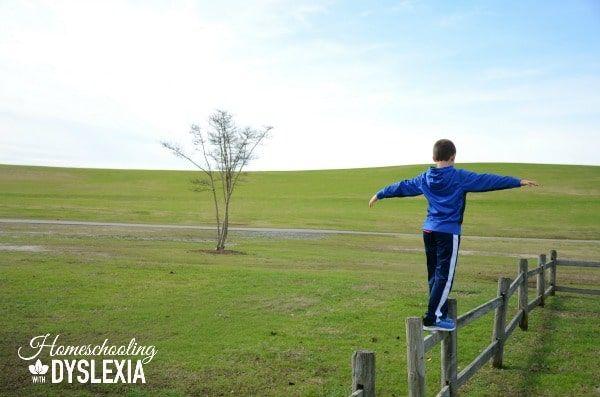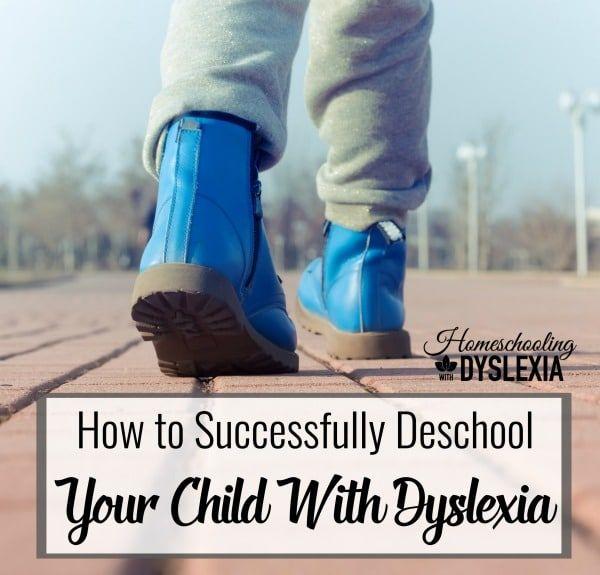If you are experiencing resistance to learning with a child with dyslexia, taking time to deschool your child can help your child.
What does it mean to deschool?
Deschooling is stepping away from academics for a period of time in order to decompress from the pressure and stress of your child’s stressful learning experiences. This time is used to restore an interest in learning and create new, healthier habits of learning.
Taking a break from formal academics, even for a short time, can fly in the face of reason since many kids with dyslexia are not performing at ‘grade level’ academically due to their learning struggles.
Why Deschooling Helps
The pressure on kids with learning struggles to keep up with their peers can take a significant toll on a child’s confidence and desire to learn.
Here are some benefits of deschooling a child with dyslexia:
Calms anxiety: Kids with dyslexia and other learning differences often battle anxiety whether they’re homeschooled or in a public or private school. Anxiety can significantly impact a child’s ability to learn. Taking the pressure off for a time can help kids feel less anxious and more in control of the direction their education is headed.
Boosts confidence: Having difficulty learning day after day can cause kids with dyslexia to lose confidence. Believing that you aren’t intelligence is one of the most devastating myths about dyslexia that are hurting our kids today. Taking a break from formal academics to spend time on interests and relationships takes the focus off of your child’s areas of weakness and onto areas of strength.
Increases interest in learning: Many kids who are resisting learning have developed a closed mindset with regards to their ability to learn. Continual failure to meet academic expectations can leave many kids believing that, not only are they not smart, but that they cannot learn. When kids take time away from formal academics to focus on their interests for a time, they experience real life learning and interest increases.
Allows time to focus on the parent-child relationship: Studies of successful dyslexics revealed that the one thing that had the biggest impact on their success was the presence of one caring adult. Taking time to show your child that you are on their side and that you want what is best for them will help them to relax and trust you on your new homeschooling journey!

How to Deschool Your Child With Dyslexia
Talk to your child. Let your child know that you are taking some time away from formal studies to heal and enjoy life together. Encourage them to discuss things that they liked and disliked about school.
Take a break from formal academics. While this may seem counterintuitive for a child who was ‘behind’ in school, trust the process. Taking a break to restore a child’s interest in learning will help them to learn more effectively once you get back to the books.
This can look like a complete break from all academics or a break from subjects that are particularly stressful for them.
Go exploring. Begin to nurture your child’s interests by getting out of the house and taking trips to places of interest such as zoos, museums, national parks – anywhere that is of interest. Allow your child to choose where to go. There is a lot of freedom in homeschooling. Take some time to enjoy your freedom to create your own schedule! Notice how much learning actually takes place on outings like these.
Get connected. Find a local homeschool group and more importantly, find a dyslexia support group where you can ask questions and get encouragement when needed.
Read out loud. The benefits to reading out loud to kids are many, but for the dyslexic child, it is even more powerful. Without the pressure to do the reading themselves, their enjoyment of reading and of a good story are increased – not to mention the increase in vocabulary and understanding of more complex grammatical structures.
Do life together. Cook, garden, clean out their rooms, visit family and friends. Kids who are used to being around other people all day can feel lonely or isolated when first leaving school. Spending time with friends and family can help with this. Filling our kids’ days with meaningful interactions can help them feel productive and begin to tap into a new rhythm of life.
Deschooling for Parents
As important as it is for kids to have some time to deschool, parents benefit from some time to deschool as well. Most parents only know school in the traditional setting. Creating a ‘school-at-home’ is a common choice among new homeschoolers. I strongly encourage you to take some time to learn about different homeschool methods, learning styles and curriculum choices before getting started.
Related articles:
Mindset Shifts for Parents of Struggling Learners
What is a Growth Mindset and How Having One Can Help Your Kids
How to Teach Your Kids to Have a Growth Mindset







This is such great information. I needed this reminder to do some deschooling this summer, along with some content work too – the 3 R’s